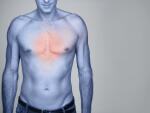GERD happens when the lower esophageal sphincter (LES) does not close properly. This ring of muscle normally keeps stomach acid in the stomach and out of the esophagus.
When this does not work the way it should, acid backflow irritates the esophageal lining, causing heartburn and other symptoms, such as tasting stomach contents or a sour liquid at the back of the throat.
This guide discusses treatments for GERD, as well as its symptoms, causes, diagnosis, and more.
Key facts about GERD
- GERD is the chronic flow of stomach acid into the esophagus.
- GERD occurs as a result of the LES not closing properly.
- Symptoms include heartburn and a sour taste at the back of the throat.
- Between 18.1% and 27.8% of people in the U.S. experience GERD.
Read on to learn more about GERD.

As with most chronic progressive conditions, GERD is categorizable into different stages. These four stages are based on the frequency and severity of the symptoms and what treatments may help you manage those symptoms. They are as follows:
- Stage 1 (mild GERD): Mild symptoms a few times per month are manageable with lifestyle changes and over-the-counter (OTC) acid reflux medications, such as antacids.
- Stage 2 (moderate GERD): More frequent symptoms require prescription acid suppressors, such as H2 blockers or proton pump inhibitors (PPIs), to reduce acid production.
- Stage 3 (severe GERD): GERD symptoms can be hard to control, even when taking prescription medications, and they may include erosive esophageal inflammation.
- Stage 4 (GERD with severe complications): Complications that can affect the esophagus include strictures, precancerous lesions (Barrett’s esophagus), and esophageal cancer.
Once you receive a GERD diagnosis, your doctor will be able to tell you more about your stage of the condition and what treatments you may require.
Frequent heartburn is the most common symptom of GERD. The pain, burning, or discomfort of acid reflux typically occurs in the chest behind the breastbone. It usually happens after eating or when you lie down.
Other common symptoms of GERD include:
- nausea
- coughing
- frequently needing to clear your throat
- a sore throat or hoarseness
- a recurrent sour or bitter taste in the mouth
- difficulty swallowing
- regurgitation, which is when stomach fluids flow into the mouth
- a tight chest or upper abdomen
Without treatment, GERD can cause complications such as Barrett’s esophagus and esophageal cancer. The risk of complications increases with a longer duration of chronic heartburn.
Contact your doctor as soon as you experience symptoms of GERD to reduce the risk of complications.
In many cases, you can relieve the symptoms of GERD by making diet and lifestyle changes. Some specific ways to manage heartburn and acid reflux include:
- monitoring the medications you are taking, as some may irritate the lining of your stomach or esophagus
- avoiding smoking
- avoiding or reducing your intake of alcohol and caffeine
- avoiding foods that can trigger symptoms, including:
- fried and fatty foods
- peppermint
- chocolate
- citrus fruit and juices
- tomato products
- eating small meals and avoiding overeating
- avoiding lying down or going to bed for at least 2 hours after a meal
- maintaining a moderate body weight
- taking an OTC antacid for heartburn, as directed by your doctor
Another acid reflux remedy involves elevating the head of the bed 6–8 inches. Techniques for this include:
- placing blocks under the head of the bed
- positioning a wedge cushion between the mattress and box springs
- using an adjustable bed
GERD medications
If symptoms continue despite making lifestyle and dietary changes, your doctor may prescribe a medication. Some GERD medications are also available over the counter without a prescription.
Contact your doctor to discuss what medication is right for you. Examples of medications they might recommend include:
- antacids to neutralize stomach acid right away
- PPIs to block acid production better than H2 blockers, including:
- H2 blockers to reduce stomach acid production, including:
- cimetidine (Tagamet)
- famotidine (Pepcid)
- nizatidine (Axid)
- prokinetics to help your stomach empty faster and increase LES tone or pressure
- Your doctor may prescribe these if you do not get relief when taking PPIs. They can include bethanechol (Urecholine) and metoclopramide (Reglan).
GERD or acid reflux surgery
Surgery may also be an option if medications do not help.
The most common type of GERD surgery is laparoscopic Nissen fundoplication. It involves wrapping the top of the stomach around the LES. This tightens it and adds pressure to prevent reflux.
Learn more about fundoplication here.
Proper nutrition is one component of a healthy lifestyle that can help you reduce your risk of developing GERD or help you manage acid reflux symptoms. This includes eating foods that can help reduce GERD symptoms and avoiding foods that can make GERD worse.
What foods should I eat if I have GERD?
Dietary changes that can be beneficial if you have GERD typically involve replacing triggers with options that are less likely to cause symptoms. For example, fatty meats can trigger GERD, so it is best to consume a diet that contains lean meats.
Other examples of foods to consume if you have GERD include:
- non-citrus fruits, such as:
- apples
- bananas
- melons
- pears
- vegetables other than tomatoes and onions
- eggs, particularly the whites if egg yolk contributes to your GERD
- unsaturated fats from plants and fish instead of saturated or trans fats
What foods should I avoid with GERD?
Foods and beverages that you should avoid if you have GERD can depend on what you find triggers your symptoms. However, common food and drinks to avoid for GERD include:
- foods that are high in fat
- caffeine
- chocolate
- peppermint
- citrus fruits
- onions
- tomato-based foods
- carbonated beverages, such as sodas
- alcohol
Contact your doctor before making any significant changes to your diet.
GERD is the result of stomach fluids flowing up into the esophagus. Normally, the LES keeps stomach contents from entering the esophagus. With GERD, however, the LES is less able to provide this protection.
The LES may be too weak, or it may relax when it should not. As a result, the lining of the esophagus becomes irritated and painful from contact with stomach fluids.
What causes the lower esophageal sphincter to become damaged?
The LES can become damaged due to numerous factors, which can include:
- overweight or obesity
- frequently eating large portion sizes
- hiatal hernia
- some medications
- pregnancy
- smoking
- excessive alcohol consumption
Contact a doctor if you experience recurring and severe acid reflux. It is important to make sure that you can receive treatment for GERD to avoid risks of complications or damage to the esophagus.
View our GERD appointment guide for tips ahead of your doctor’s appointment.
It is possible for a doctor to diagnose GERD by considering your symptoms and performing a physical exam.
Imaging exams can be helpful to confirm the diagnosis or check for GERD-related problems. These can include:
- ambulatory acid (pH) impedance test, which uses a small probe to monitor the amount of acid in the esophagus
- esophageal manometry, which measures how the esophagus functions
- upper endoscopy, which involves inserting a thin, flexible scope down the throat to view the esophagus and stomach
- X-ray of the upper digestive tract, which involves consuming a drinkable barium solution to coat the lining of the digestive tract
People of all ages can develop GERD. However, various factors can contribute to a weakened LES and the development of GERD.
These risk factors can include:
- being overweight or having obesity
- being pregnant
- having a hiatal hernia
- smoking
- taking certain medications, including:
- nonsteroidal anti-inflammatory drugs, such as ibuprofen and naproxen
- heart and blood pressure medications, such as nitroglycerin and calcium channel blockers
- osteoporosis drugs or bisphosphonates
- progestins, such as progesterone
- antihistamines
- antidepressants
- consuming large amounts of certain foods, including:
- chocolate
- coffee
- fatty foods
- peppermint
- spearmint
- whole milk
Learn more about medications that can cause heartburn here.
Without proper treatment, GERD can eventually lead to medical complications. Some of these can be serious and even life threatening.
Complications of GERD
- Erosive esophagitis: This refers to erosions or ulcers of the esophageal mucosa. You may be asymptomatic, or it may make your GERD symptoms worse.
- Esophageal stricture or narrowing: This can occur due to scarring from chronic damage. People may actually notice less heartburn when this happens because of the narrowing, but it can make swallowing difficult because it restricts the space for food to pass through.
- Barrett’s esophagus: Barrett’s esophagus refers to a change in the tissue that lines the lower end of the esophagus. The cells look like the lining of the intestine or the stomach instead of normal esophageal cells. Barrett’s esophagus increases your risk of esophageal cancer.
- Esophageal cancer: You may develop esophageal cancer if you have Barrett’s esophagus. Smoking and drinking lots of alcohol can also increase this risk and potentially exacerbate existing GERD symptoms.
Contact your doctor as soon as you experience symptoms of GERD to reduce your risk of complications.
It is possible to prevent GERD or reduce your risk of the condition. This involves making lifestyle and diet changes, which can also be part of the treatment for GERD.
Steps you can take to prevent or reduce the risk of GERD include:
- avoiding or limiting your intake of alcohol, caffeine, and foods that trigger acid reflux
- eating small meals and not lying down for 2–3 hours afterward
- elevating the head of your bed 6–8 inches
- maintaining a moderate weight
- avoiding smoking
- wearing loose-fitting clothing around your abdomen
- chewing gum or using lozenges to aid saliva production
Here are some more frequently asked questions about GERD.
How can I get rid of a GERD cough?
Instead of coughing, try to exhale forcefully. This can help stop you from feeling like you need to clear your throat. Cough lozenges may also help, and they may also encourage the production of saliva. However, avoid lozenges that contain menthol, as these can dry out your throat.
Does GERD ever go away?
Although there is currently no cure for GERD, you can manage the condition to reduce or prevent symptoms. This can involve making lifestyle and dietary changes, taking medications, and, in some cases, undergoing surgery for longer-term management.
Is milk good for acid reflux?
Whole milk can contribute to symptoms of GERD. Low fat milk may help soothe heartburn, but it is advisable to instead try OTC calcium-based treatments, such as Tums or Maalox.
Find more articles and information in our acid reflux and GERD hub.
GERD occurs when there is a frequent backflow of stomach acid into the esophagus. The main symptom of GERD is heartburn, but you can also experience other symptoms, such as coughing and a bitter taste in your mouth.
The main treatments for GERD include lifestyle and diet changes, such as avoiding triggering foods and sleeping at an elevated angle. In some cases, your doctor may also prescribe medications, and surgery can also help provide longer-term management of more severe GERD.
Contact your doctor if you experience any symptoms of GERD. Getting an early diagnosis can help reduce the risk of complications.



